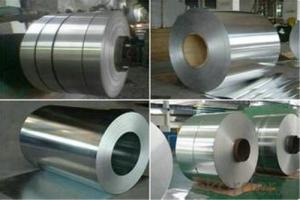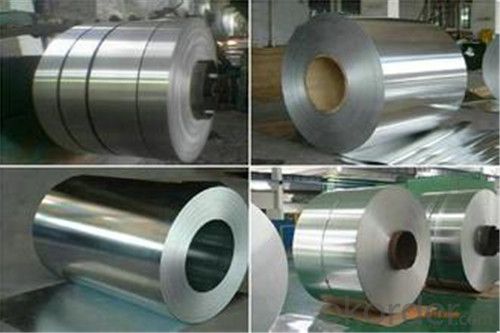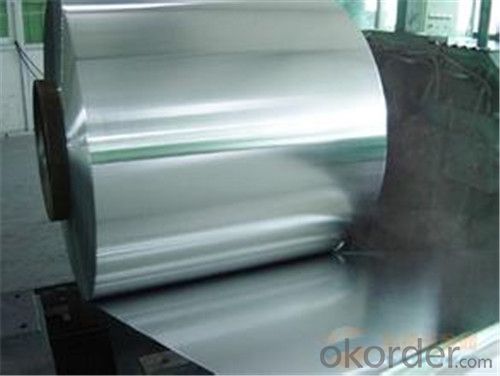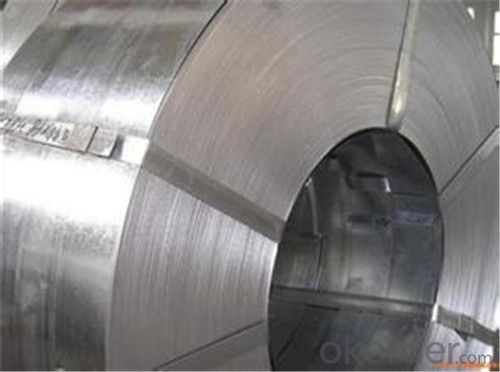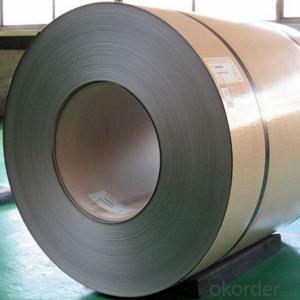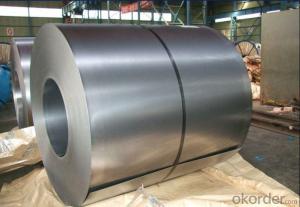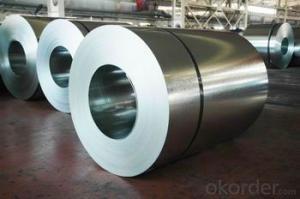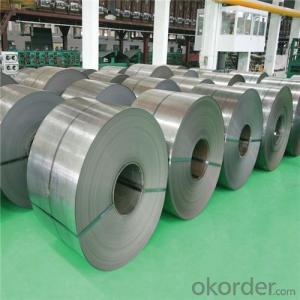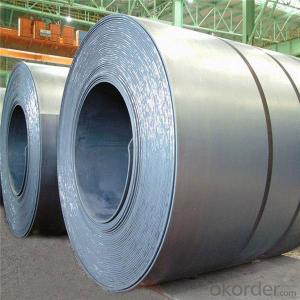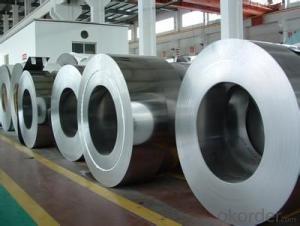Rolled Steel Coil/Plates with High Quality
- Loading Port:
- Tianjin
- Payment Terms:
- TT OR LC
- Min Order Qty:
- 100 m.t.
- Supply Capability:
- 89000000 m.t./month
OKorder Service Pledge
OKorder Financial Service
You Might Also Like
Description of cold rolled steel coil :
The raw material of cold rolled steel coil/sheet is high quality hot rolled product, and after pickling, kinds of new technology and new process of global cold rolling production have been applied. Therefore the manufacturing, home appliance, automobile etc.
Specification of cold rolled steel coil :
1. Width: 600~1500mm
2. Thickness: 0.15~2.30mm
3. Grade: JIS G3321-SGLCC, SGLC400-570, (G550)
EN10346-DX51D+AZ, DX53D+AZ, S250-S550
ASTM A792M CS-B, SS255-SS550
4. Chemical Treatment: Chromated
5. Surface: Anti-Finger Print
6. Oil: Slight Oiled / Dry
7. Spangle: Regular
8. Zinc Coating: AZ50~AZ185g/m2
9. Coil Weight: 3~14MT
10. Coil ID: 508mm / 610mm
11. MOQ: 60MT per size or by negotiation
Characteristic cold rolled steel coil :
1. Refrigerators, cabinets, power distribution baords and drums.
2. Automobile floor and roof panels.
3. Automobile fenders and quarter panels
4. Automobile fenders and quarter panels
Images of cold rolled steel cold rolled steel coil:
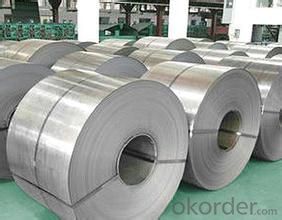
FAQ
1.What's your MOQ?
50MT, it is for one container.
2.Whether your company have QC teams?
Yeah, sure, our QC team is very important, they will keep the quality control for our products.
3. What's your normal delivery time?
Our delivery time about 10-20days for standard sizes, if you have other requirements like hardness and width ,it is about 20-40days. But don't worry ,we also try our best for the
- Q: I am a beginner (never played before!) and I am going to try to teach myself since I think it is a lovely instrument. I am fourteen-years-old so I am not 'adult-size', haha. Anyway, what is difference between nylon strings and steel strings?Thanks :)
- Make your choice based on the type of music you intend to play. Nylon strings are used primarily for classical, flamenco and folk music. Steel strings are used for pop, rock, blues, country, folk, bluegrass.... Both types of guitar are tuned the same, so you *can* play any style of music on either guitar. The big difference is in the tone. Nylon strings are rich and full...if perhaps a little mellow. Steel strings are twangy and have a bite to the sound. There are differences in the construction and feel of the guitars, but that's not critical to your decision. Match the guitar to the music you intend to play. At 14 yrs old, you are certainly big enough for a full sized guitar....and I'll bet you're still growing, right? Even full sized guitars still vary in the size of the body. Try a few out to see how well they fit your reach.
- Q: How are steel coils used in the production of metal partitions?
- Steel coils are used in the production of metal partitions by being processed and cut into sheets, which are then formed and welded together to create the partitions. The steel coils provide a strong and durable material that can withstand the rigors of partition construction and installation.
- Q: What is the role of steel coils in the manufacturing of agricultural machinery?
- Steel coils play a crucial role in the manufacturing of agricultural machinery as they are used to fabricate various components and parts such as frames, chassis, blades, and implements. The high strength and durability of steel make it an ideal material for withstanding the harsh conditions and heavy-duty applications that agricultural machinery often faces. Additionally, the versatility of steel coils allows manufacturers to customize and shape them into different forms and sizes, ensuring the production of reliable and efficient agricultural machinery.
- Q: How do steel coils contribute to the construction sector?
- Steel coils play a crucial role in the construction sector in various ways. Firstly, steel coils are extensively used in the manufacturing of structural components such as beams, columns, and trusses. These components form the backbone of buildings and provide the necessary strength and stability to the structure. Steel coils are processed and shaped into these structural components, ensuring that they can withstand the heavy loads and forces experienced in construction. Additionally, steel coils are utilized in the production of reinforcement bars, commonly known as rebars. These rebars are embedded within concrete structures, enhancing their tensile strength and preventing cracks or fractures. This reinforcement is essential in constructing durable and resilient infrastructure, from bridges and highways to buildings and stadiums. Moreover, steel coils find applications in the fabrication of roofing and cladding materials. The coils are processed and formed into corrugated sheets or panels, which are then used to cover roofs and walls. These steel roofing and cladding materials offer excellent protection against environmental factors such as rain, wind, and UV radiation. Furthermore, they provide thermal insulation, fire resistance, and aesthetic appeal to the constructed buildings. Furthermore, steel coils contribute to the construction sector through their use in the production of various mechanical components, including pipes, tubes, and fittings. These components are essential for plumbing, heating, ventilation, and air conditioning systems in buildings. Steel's durability, corrosion resistance, and ability to handle high-pressure conditions make it an ideal material for these applications. The versatility, strength, and durability of steel coils make them indispensable in the construction sector. They provide the necessary materials for constructing robust structures, reinforcing concrete, and producing essential components. Steel coils not only contribute to the safety and longevity of buildings but also play a vital role in the overall development and growth of the construction industry.
- Q: What are the different types of steel coatings for coils?
- Coils can be coated with various types of steel coatings, each with its own unique properties and advantages. Some of the most commonly used coatings include: 1. Galvanized Coating: This type of steel coating is widely utilized for coils. It involves applying a layer of zinc to the steel, which provides excellent protection against rust and corrosion. It is particularly suitable for outdoor applications or environments with high moisture levels. 2. Galvannealed Coating: Galvannealed steel coating involves subjecting the galvanized steel to additional heat treatment, resulting in a matte finish and improved adhesion for paint. It offers enhanced corrosion resistance and is often preferred in the automotive and construction sectors. 3. Aluminized Coating: Coating steel coils with aluminum provides outstanding heat resistance and corrosion protection. Aluminized steel is commonly employed in exhaust systems and other applications involving high temperatures. 4. Organic Coatings: Steel coils can also be coated with organic materials like paints or powder coatings. These coatings offer additional protection against corrosion and can be customized to meet specific aesthetic requirements, available in a wide range of colors. 5. Tin Coating: Tin-plated steel coils are covered with a layer of tin, which provides excellent solderability and resistance to corrosion. This type of coating is frequently used in the production of cans and other food packaging materials. 6. Phosphate Coating: Phosphate coatings are often applied as a pre-treatment before other coatings to enhance adhesion and corrosion resistance. They create a thin, crystalline layer on the steel surface, facilitating better adhesion of paint or powder coatings. These examples illustrate the diversity of steel coatings available for coils. The choice of coating depends on specific application requirements, considering factors such as corrosion resistance, heat resistance, paint adhesion, and aesthetic preferences.
- Q: What are the different surface finishes of steel coils?
- There are several different surface finishes of steel coils, including mill finish, galvanized finish, painted finish, and coated finish.
- Q: Can steel coils be custom-made to specific requirements?
- Yes, steel coils can be custom-made to specific requirements. Steel manufacturers have the capabilities to produce steel coils with various dimensions, thicknesses, and specifications to meet the specific needs of customers. These coils can be customized in terms of width, length, weight, and even surface finish to suit specific applications and industries. Customization can also include variations in steel grade, coating type, and mechanical properties to ensure the desired performance and functionality. The ability to tailor steel coils to specific requirements allows for optimal utilization in various sectors such as automotive, construction, appliances, and manufacturing, among others.
- Q: What are the common welding methods used for steel coils?
- The common welding methods used for steel coils include shielded metal arc welding (SMAW), gas metal arc welding (GMAW), flux-cored arc welding (FCAW), and submerged arc welding (SAW).
- Q: How are steel coils used in the manufacturing of railway bridges?
- Steel coils are used in the manufacturing of railway bridges as they are rolled and shaped into various structural components like beams, girders, and plates. These coils provide the necessary strength, durability, and flexibility required to support heavy loads and withstand the dynamic forces exerted on the bridge.
- Q: How are steel coils inspected for uniformity?
- Steel coils are inspected for uniformity through a series of visual and mechanical tests. Firstly, the external appearance of the coil is examined to ensure it is free from any visible defects such as dents, scratches, or rust. This is important as it ensures the coil's overall integrity and prevents potential issues during further processing. Next, the thickness of the coil is measured at various points using non-destructive testing techniques like ultrasonic or magnetic particle inspection. This helps identify any variations in thickness, which could affect the coil's overall quality and performance. Additionally, the width of the coil is measured using precision instruments to check for any deviations from the required specifications. This ensures that the coil is within the desired width range, which is crucial for compatibility with downstream processes and applications. Furthermore, the weight of the coil is measured to verify if it falls within the specified range. This is typically done using weighing scales or load cells, ensuring that the weight is consistent and meets the required standards. In terms of internal inspection, steel coils are sometimes subjected to eddy current testing, a non-destructive method that detects surface and near-surface defects. This technique uses electromagnetic induction to identify any irregularities in the metal, enabling the identification of defects such as cracks, voids, or inclusions. Overall, a combination of visual inspections, thickness measurements, width checks, weight verification, and internal testing methods ensures that steel coils are thoroughly inspected for uniformity. These rigorous inspection processes help guarantee the quality and reliability of the coils, allowing them to meet the industry standards and customer requirements.
Send your message to us
Rolled Steel Coil/Plates with High Quality
- Loading Port:
- Tianjin
- Payment Terms:
- TT OR LC
- Min Order Qty:
- 100 m.t.
- Supply Capability:
- 89000000 m.t./month
OKorder Service Pledge
OKorder Financial Service
Similar products
Hot products
Hot Searches
Related keywords
